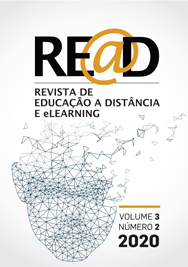Distance Education in Higher Education in Brazil: the perspective of institutional managers and pole coordinators
DOI:
https://doi.org/10.34627/vol3iss2pp3-25Keywords:
Distance education; Open University of Brazil; University education; EaD management; Institutionalization of distance education.Abstract
This article is based on the results of a PhD research in Education on the process of managing higher education courses in distance education in Brazil, within the scope of the Open University system and private university institutions. It aims to present and analyze the challenges faced by Higher Education Institutions in the management of distance courses and to point out some strategies used by managers to solve / minimize problems. Theoretically, it contextualizes distance education in contemporary times and rescues the evolution of public policies in Brazil. The methodological strategy used was the multiple case study and involved a simple random sample, consisting of 202 polo coordinators and 10 institutional managers. For data analysis, triangulation of sources and content analysis were used (Bardin, 2006). The results reveal the need to invest efforts towards familiarizing students with the pedagogical model of distance education; understanding the reasons for evasion and developing effective strategies to minimize it; demystification of the belief that distance education corresponds to low quality education; and in the valuation and qualification of teachers. In conclusion, the importance of re-evaluating the pedagogical strategy, the reorganization of the curricular matrix and the pedagogical mediation processes is emphasized, based on the knowledge of the student profile so that distance education is qualitatively consolidated in the educational system.
Downloads
Published
Issue
Section
License
Copyright (c) 2020 Márcia Vieira

This work is licensed under a Creative Commons Attribution-NonCommercial 4.0 International License.
Os autores conservam os direitos de autor pelo seu trabalho e concedem à revista o direito de primeira publicação, com o trabalho simultaneamente licenciado sob uma Licença Creative Commons - Atribuição-NãoComercial 4.0 Internacional.



